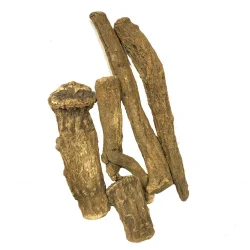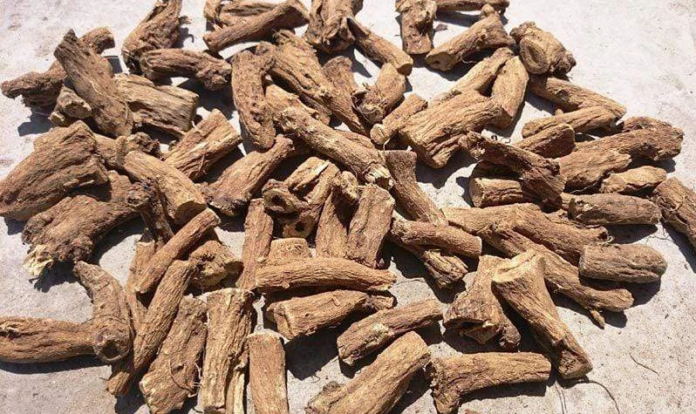
Introduction
Indian Costus Root, also known as Kust e Talkh or Qust al Hindi in Arabic and Persian, is a prominent herb in traditional medicine, particularly in Ayurveda and Unani systems. The root of the plant Saussurea costus (also called “costus root”) has been used for centuries for its wide range of therapeutic properties. In ancient times, it was highly valued as a medicinal herb, often referred to as a “royal herb” due to its unique aroma and diverse uses.
Forms of Indian Costus Root (Kust e Talkh / Qust al Hindi)
Indian Costus Root comes in several forms depending on how it is processed and used:
Raw Root: The most common form is the raw dried root, which can be powdered or used whole. This form is traditionally used in Ayurvedic medicines.
Powder: The dried root is powdered and used to prepare decoctions, capsules, or tablets. The powder is often combined with other herbs for enhanced effects.
Oil: In some regions, costus root is distilled into an essential oil. The oil is used for topical applications, aromatherapy, or sometimes added to herbal formulations for internal use.
Decoction: The root can also be boiled in water to create a medicinal decoction. This liquid form is commonly consumed for its health benefits.
Capsules and Tablets: Modern formulations often contain powdered costus root encapsulated in tablets or capsules for ease of consumption.
Benefits of Indian Costus Root (Kust e Talkh)
Indian Costus Root has been traditionally used for treating a variety of conditions due to its medicinal properties. Here are some of the most notable benefits:

Digestive Health: Costus root is known for its positive effects on digestion. It stimulates appetite, promotes healthy digestion, and alleviates symptoms like bloating, indigestion, and constipation. It is often used as a digestive tonic in both Ayurvedic and Unani practices.
Respiratory Health: The root is also beneficial for the respiratory system. It is commonly used as an expectorant to treat coughs, bronchitis, and asthma. Its warming properties help clear mucus from the lungs and relieve congestion.
Anti-inflammatory: Kust e Talkh is known for its anti-inflammatory properties. It can help reduce inflammation, making it useful for conditions such as arthritis, gout, and muscle pain.
Liver and Detox Support: The root has hepatoprotective properties, meaning it can protect the liver from damage. It is used in various detox programs to cleanse the liver and improve overall metabolic functions.
Antibacterial and Antifungal: Research has shown that costus root has antimicrobial properties. It is effective against various bacterial and fungal infections and can help treat conditions such as skin infections and respiratory tract infections.
Skin Health: Due to its antibacterial and anti-inflammatory properties, Kust e Talkh is also used in topical applications to treat skin conditions like eczema, acne, and rashes. It helps to soothe irritated skin and promotes healing.
Blood Circulation: The herb is believed to improve blood circulation, which can aid in reducing high blood pressure, improving energy levels, and promoting overall heart health.
Anti-cancer Potential: While research is ongoing, some studies suggest that certain compounds in Indian Costus Root may have anti-cancer properties. It has been shown to inhibit the growth of cancer cells in laboratory settings, particularly in cancers related to the digestive and respiratory systems.
Side Effects and Precautions
While Indian Costus Root is widely used in traditional medicine, it should be taken with caution. Here are some potential side effects and precautions:

Toxicity: In large quantities, the root can be toxic, leading to symptoms like nausea, vomiting, dizziness, and diarrhea. It is essential to use the herb under proper guidance and avoid overconsumption.
Pregnancy and Breastfeeding: Pregnant and breastfeeding women should avoid using costus root unless prescribed by a qualified healthcare provider. The herb can have strong effects on hormonal levels and may interfere with pregnancy.
Allergic Reactions: Some individuals may experience allergic reactions such as rashes, itching, or respiratory distress when using costus root. A patch test is recommended before using it topically or ingesting it for the first time.
Drug Interactions: Indian Costus Root may interact with certain medications, especially those related to blood pressure, diabetes, and anti-inflammatory drugs. It’s important to consult a healthcare professional before using it alongside other medications.
Liver Damage in Excessive Use: Despite its protective qualities for the liver, excessive use of Kust e Talkh may cause liver toxicity. This is particularly true for individuals with pre-existing liver conditions.
Not Suitable for Children: Due to its potency, this herb is generally not recommended for children unless prescribed by a healthcare professional.
This Article is for Basic Information. Contact a professional doctor before using it.
HAKEEM KARAMAT ULLAH
+923090560000




